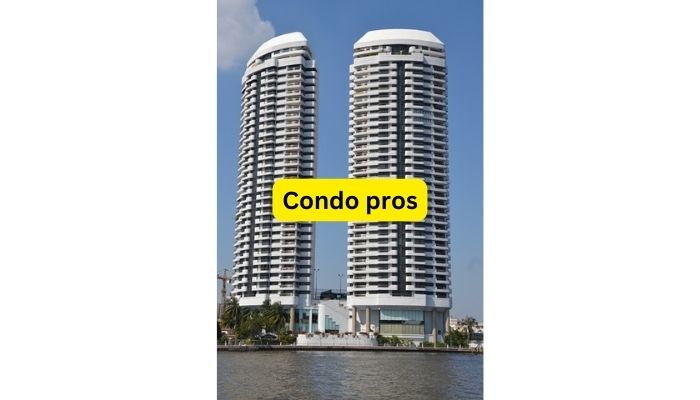Should I Buy A Condo or a House? – The decision to purchase a condominium or house may seem like an obvious one at first glance, but there are some pros and cons in each category that you should consider before investing in a condo versus a single-family house. Budget, life stage and lifestyle are all factors that might sway your ultimate decision.
Most often, condos are part of a larger residential complex of attached homes that include shared amenities like a fitness room or pool. Buying a condo means that you own a piece of a larger community that is overseen by a board of directors.
What is a condo?
A condo is a privately owned unit within a community of other privately owned units, typically with shared recreational amenities and other common areas. You typically own all your condo’s internal space — the wall-to-wall, floor-to-ceiling interior space. The ownership structure for the common areas and recreational facilities may vary by condo association or building.
8 Ways To Make Money With Airbnb Without Owning Property
A condo’s physical structure varies depending on the community. They can be found in high rises, traditional apartment-style complexes, or even as detached structures, similar to single-family homes in some cases. To manage shared spaces and amenities, condos are typically overseen by a condo association, which assesses monthly fees that unit owners pay for the maintenance of commonly owned areas, insurance and other shared expenses.
Should I Buy A Condo or a House?
Condo ownership is typically confined to singular units within a larger complex (though it’s possible to buy multiple units), whereas homeownership may include ownership of the physical structure of the house and the land it sits on.
House vs. condo vs. townhouse vs. apartment:
| Living Space | Cost | Ownership | Best for |
|---|---|---|---|
| House | Down payment and monthly mortgage payment, maintenance | House and property it sits on | Couples, families |
| Condo | Down payment, monthly mortgage payment and HOA fees | Unit | First-time homebuyers, downsizers |
| Townhouse | Down payment, monthly mortgage payment and HOA fees | Unit and property it sits on | Those who want more space than a condo, but not all the responsibilities of a house |
| Apartment | Security deposit and monthly rent | No ownership | Those who want flexibility to relocate or are saving for a down payment |
Condo pros:
Affordability – Condos are typically less expensive than a house, so they can be ideal for first-time homebuyers with limited down payment savings or retirees wanting to scale back.
Less maintenance – If you own a house, all of the upkeep of the property falls on you. If you don’t want to worry about maintenance as much, a condo might be a better fit.

More perks – Unlike a house, many condo communities come with amenities like a pool or playground, and features like security systems. If you want these for your house, you’ll have to install and pay for them yourself.
Condo cons:
Fees – Condo associations charge a monthly HOA fee to cover upkeep and other expenses, including insurance coverage for the property as a whole. They may also impose special assessments from time to time, to cover financial shortfalls or unexpected expenses. Individual condo owners have no say in the setting of these fees or choice of carriers, unless they join the condo board of directors.
8 Top Things to Do in Little Havana, Miami
Less privacy – Since you’re sharing walls with neighbors, you won’t have as much privacy or quiet as you might be able to get with a house. And you’ll have to share amenities like the gym or pool.
Rules – You might not have as much freedom to decorate or customize your condo, depending on your HOA’s rules
House pros:
Customizability – If you own a house and it’s not in an association, you can do pretty much whatever you want to it, provided it adheres to your local jurisdiction’s ordinances.
Privacy and space – With a house, you might be farther away from your neighbors, so you won’t have to worry about excess noise or privacy issues.
Easier to sell – You won’t have to get the approval of an HOA to sell your house, so there’s one less barrier when it comes time to put your house on the market. Houses also offer a better return on investment.
House cons:
Can be pricey – Depending on its location, size and many other factors, a house can be much more expensive than a condo or other type of property.
Maintenance is your responsibility – Unlike a condo, with a house, you’re tasked with maintaining the property, both indoors and out. This can add to your costs.
Lack of built-in community – Compared to the shared spaces of a condo, it can feel a bit more isolating in a house. You might not run into neighbors as frequently, which can be a downside if you value social opportunities.
Bottom Line: Which Should You Buy?
There’s no universal right answer. If you’re thinking about a return on investment, houses can have a higher resale value than condos because of their larger sizes and more extensive outdoor spaces. Condos may also be harder to finance than houses because lenders can have stricter requirements. But, as with all financial investments, you’ll need to consider different factors, including location, taxes, amenities and the condition of either property.
A good rule of thumb to evaluate whether you should buy a condo or a house is to consider your lifestyle. If you like the convenience of living in an apartment, from the location to maintenance, then a condo might be the right choice for you. But, if you prefer more room and freedom to control your own space, a house might be the move.

